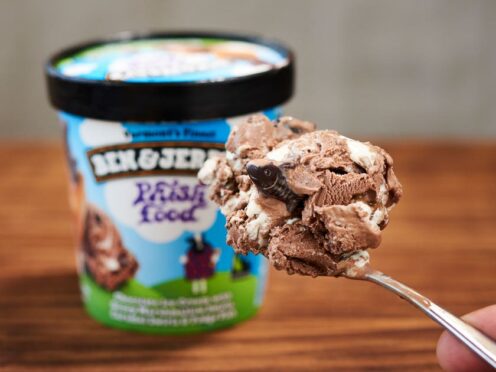Unilever has announced plans to spin off its Ben & Jerry’s ice cream division and cut around 7,500 jobs globally as part of a major group-wide shake-up.
The firm, which also produces Marmite and Dove soap, said the jobs affected would be largely office-based as it looks to invest in artificial intelligence (AI) and IT to boost productivity and save around 800 million euro (£684 million) over the next three years.
The roles are expected to go over the next two years, although staff will be consulted about the cuts.
Unilever did not reveal how many jobs would go in each country but it is expected that its 6,000-strong UK workforce will be among those affected.
The company, which is headquartered in Blackfriars, London, has 128,000 employees globally.
The firm also revealed the overhaul would see it spin off its ice cream business – which also includes Wall’s and Magnum brands – most likely through a separate stock market listing.
The group’s bosses confirmed that AI would “play a role” in the jobs cull as part of a “comprehensive” programme to invest in technology.
It said it was too early to give details on the types of jobs that would be affected, given the need to consult with staff, but confirmed roles would go across sites including its head office and corporate centres.
The group’s UK footprint includes its London HQ and a site in Leatherhead, although it is planning to relocate both to a new base in Kingston, London, next year.
Chief executive Hein Schumacher said: “Under the growth action plan we have committed to do fewer things better, and with greater impact.
“The changes we are announcing today will help us accelerate that plan.”
He added: “We are very aware how unsettling this will be for our people around the world.
“We are committed to carrying out the process with respect and care for those impacted”.
Unilever said while the ice cream arm would likely be demerged via a stock market listing, it would consider other options to “maximise returns for shareholders”.
It has not yet decided whether the ice cream arm would be listed in London or the Netherlands, where the division is currently headquartered.
The group will kick-start the demerger process immediately, with full separation set to be completed by the end of next year.
The ice cream division delivered turnover of 7.9 billion euro (£6.8 billion) last year, but Unilever said it differed from the rest of the group due to its seasonal sales nature, while it also has a frozen supply chain and “high capital requirements”.
The decision to demerge the ice cream business comes in the wake of Unilever appointing billionaire activist US investor Nelson Peltz to the board in 2022.
But Mr Schumacher – who replaced Alan Jope as chief executive last July – played down suggestions that the move followed pressure from Mr Peltz, saying: “We really need to see it as a board decision and as him being part of that.”
While the group-wide overhaul is expected to deliver significant savings, it will cost the firm about 1.2% of group sales over the next three years.
The ice cream business accounts for around 16% of global sales and up to 40% of turnover in some countries.
Ian Meakins, chairman of Unilever, said: “The separation of ice cream and the delivery of the productivity programme will help create a simpler, more focused, and higher performing Unilever.
“It will also create a world-leading ice cream business, with strong growth prospects and an exciting future as a standalone business.”
